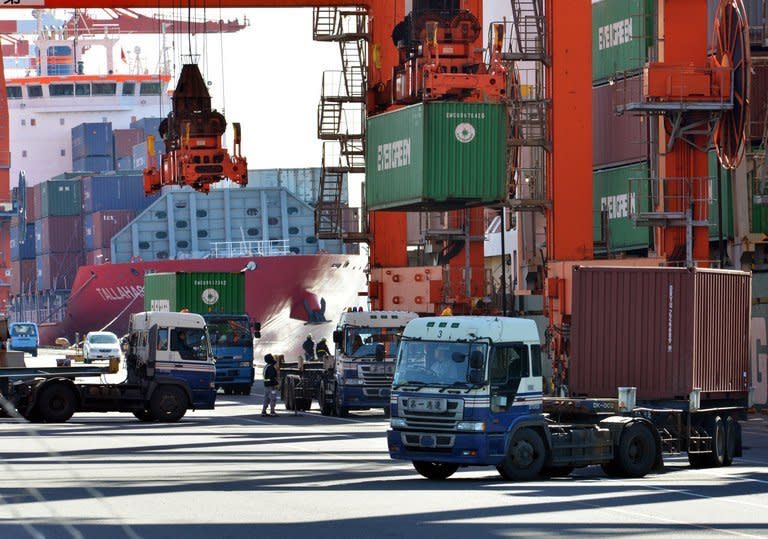Japan's Abe in on trade pact talks after BoJ win
Japan's hard-charging prime minister on Friday said he wanted in on talks to forge a huge trade pact, the latest bold move from a man who says he is determined to lick the frail economy into shape. With caveats aimed squarely at reassuring the cosseted farming industry, Shinzo Abe said Japan could not afford to miss negotiations on thrashing out the Trans Pacific Partnership (TPP). The announcement came just hours after his pick for central bank chief was approved by parliament, boosting the likelihood of more of the aggressive monetary easing he has been calling for to counter chronic deflation. "A huge economic bloc that would account for roughly a third of the world economy is about to begin," Abe told a news conference. "What the TPP is aiming to achieve is to make the Pacific Ocean a sea where goods, services and investment are freely exchanged." Supporters of the TPP say participation would give Japan's flagging economy a boost -- the government estimates by as much as 3.2 trillion yen ($33 billion) over a decade -- and increase consumer choice. They say opening up Japan's cosseted markets is vital if its stumbling economy is going to pick up speed, a key campaign promise from Abe. But opponents claim it could be a body blow to the country's ageing farmers, removing the sky-high tariffs that have sheltered them and sending many to the wall, changing the face of the countryside in the process. Japan's rural heartland is a crucial source of support for Abe's brand of conservative nationalism and any suggestion that farmers will lose their unparalleled protection could be politically costly for him. But, said the premier, the agricultural sector could not stand still. He said it was already facing challenges and participation in the TPP presented an opportunity. "I am sure that Japan's delicious and safe farm products will become popular all over the world," he said. "The TPP is not a crisis but, rather, a huge chance. I have heard many who worry that Japan's agriculture would be devastated if we join. "I promise that I will protect Japan's farm industry and Japan's food industry by any means." The TPP forms a vital plank in US President Barack Obama's vaunted "pivot" to Asia, and is seen by some as part of a US bid to contain China's rising economic might. Washington has been keen to get Japan on board because of the economic heft its participation lends to the project and Acting US Trade Representative Demetrios Marantis said the US welcomed Abe's "important announcement". But the US Alliance for American Manufacturing, which is backed by the US auto industry and is nervous of allowing Japanese rivals unfettered access to the huge auto market, was critical of the idea of Japan joining the talks. "Japan's closed market, currency manipulation, and many other concerns stand in the way. It's not worth sacrificing American jobs and American manufacturing to secure a TPP agreement at any cost," said AAM president Scott Paul. The TPP has been on the global agenda for years, but a succession of politically weak leaders have been unable to commit Japan to involvement. The fact that Abe appears ready to take the plunge is a sign, say observers, of the momentum he has gathered in the less than three months since he came to power in landslide elections. He hit the ground running on taking office on December 26 and his calls for more monetary easing, coupled with threats to change the law governing the independence of the Bank of Japan, succeeded in driving down the painfully strong yen. Helped by the slide in the currency, which helps the country's many exporters, the stock market is at more than four-year highs. Friday's upper house approval for Abe's slate of central bank chiefs -- Haruhiko Kuroda was confirmed as governor, while Kikuo Iwata and Hiroshi Nakaso got the nod as his deputies -- boosts his efforts to pull Japan out of more than a decade of deflation. The BoJ's new management team, which was approved by the lower house on Thursday, is set to take up their positions next week with the focus now squarely on their first policy meeting next month. "High hopes are resting on the ability of the Bank of Japan's new leadership to revitalise the economy," London-based Capital Economics said in a note. Kuroda, 68, is thought likely to back the premier's prescription of big spending and aggressive monetary easing, vowing during confirmation hearings to do "everything possible" to reverse years of falling prices.



